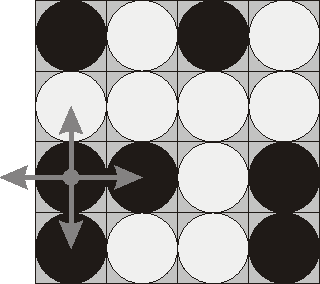- 【C语言】- 自定义类型:结构体、枚举、联合
Cavalier_01
C语言
【C语言】:操作符(https://mp.csdn.net/editor/html/115218055)数据类型(https://mp.csdn.net/editor/html/115219664)自定义类型:结构体、枚举、联合(https://mp.csdn.net/editor/html/115373785)变量、常量(https://mp.csdn.net/editor/html/11523
- 《怦然心动》:家庭环境会塑造人物性格
墨香Connie
《Flipped》,与其说这是一本关于初恋的故事,不如说这是一部关于人生的教科书。作者分别从男女主人公的视角阐述他们从相遇到相知的成长过程,将男女认知的差异直白地铺设在读者面前。Juli的一见钟情,对Bryce来说是不知所措;Juli的执着相守,对Bryce来说是痛苦的纠缠;Juli的善意提醒,对Bryce来说是多此一举......这就是成人世界的缩影,多少善意消磨在了误解、懦弱与对抗中;故事我们
- 详解mybatis的一二级缓存以及缓存失效原因
仰望天花板
缓存数据库mybatisjavamysql
数据库的大部分场景下是从磁盘读取,如果数据从内存进行读取,速度较比磁盘要快得多。但因为内存的容量有限,所以一般只会把使用和查询较多的数据缓存起来,以便快速反应,其他使用率不太多的继续存放在磁盘。mybatis分为一级缓存和二级缓存1.一级缓存一级缓存存放在SqlSqeeion上,默认开启1.1pojo@DatapublicclassRole{privateLongid;privateStringr
- 2. 变量和指令(omron 机器自动化控制器)——1
一半不眠次日si记
OMRONNJ/NX系列PLC指令基准手册自动化运维
机器自动化控制器——第二章变量和指令12-1变量一览表MC通用变量轴变量▶轴组变量运动控制指令的输入变量输入变量的有效范围▶枚举体一览表运动控制指令的输出变量运动控制指令的输入输出变量2-1变量一览表MC功能模块使用的变量分为两类。一类是监视轴等的状态及部分参数设定内容的系统定义变量。MC功能模块使用的系统定义变量被称作运动控制系统变量。还有一类是运动控制指令将指令的自变量作为输入接收、将指令的执
- 《姬魔恋战纪》如何跟妹子谈场不分手的恋爱!
专业搬砖小能手
今天小编带你来梳理一下,国产galgame手机游戏《姬魔恋战纪》里的撩妹技巧,知己知彼才能百战百胜。刘备在主人公身边一直辅助主人公的女性,对主人公几乎有着无条件的信任。把丧失记忆的主人公当作上天派来的神使看待。对待主人公的态度非常温柔、宽容,但发现主人公偷懒后,会露出严厉的表情加以责备。兴趣是泡茶。在议事厅中泡茶给辛苦工作的主人公是她的一大乐趣之一。是一位温柔、善良的女性。攻略方式:遗迹冒险,多聊
- C# 开发教程-入门基础
天马3798
教程系列整理c#开发语言
1.C#简介、环境,程序结构2.C#基本语法,变量,控制局域,数据类型,类型转换3.C#数组、循环,Linq4.C#类,封装,方法5.C#枚举、字符串6.C#面相对象,继承,封装,多态7.C#特性、属性、反射、索引器8.C#委托,事件,集合,泛型9.C#匿名方法10.C#多线程更多:JQuery开发教程入门基础Vue开发基础入门教程Vue开发高级学习教程
- WORD批量转换器MultiDoc Converter
uolian
工作word
WORD批量转换器MultiDocConverterhttps://www.52pojie.cn/thread-1318745-1-1.html可批量将doc、docx等文件格式转成doc、docx、pdf、rtf、txt、html、epub等格式。安装包下载地址:https://wws.lanzouj.com/irvVbiz0pkd最终下载文件打包地址(未作成单文件,不确定是否可以直接使用):h
- 【C语言】C语言中的构造类型(自定义类型)
写代码也摆烂
#C语言笔记c语言
构造类型:也称自定义类型,构造类型是由基本数据类型组成的复合类型。一般用于存储较为复杂的数据。常见的构造类型有结构体(struct)、共用体(union)和枚举(enum)。目录正文一、结构体(struct)1、结构体概念:2、定义结构体类型与结构体变量3、结构体变量的初始化与引用3、结构体数组4、结构体指针*二、共用体(union)三、枚举类型四、用typedef声明新的类型名1、常用的方法有:
- Python中 No module named pygame
程序员小铃铛
环境配置pygamepython开发语言
有时候运行Python程序,会出现如下错误Nomodulenamed'pygame'这个报错的意思是没有安装pygame,有的时候你可能会出现NomodulenamedXXXX这就是在说明你没有安装XXXX模块解决:1.进入cmd2.输入pipinstallxxxx表示安装这个模块我这里已经是安装了如果你出现Requirementalready表示的是你也安装了
- MyBatis系统学习(一)——项目结构及其含义
OEC小胖胖
MyBatismybatis学习web后端
1.MyBatis简介MyBatis是一款优秀的持久层框架,它通过SQL映射的方式实现Java对数据库操作的映射,既保留了SQL语句的灵活性,也简化了代码的编写。在一个MyBatis项目中,核心部分主要有:配置文件(mybatis-config.xml)映射文件(Mapper.xml)实体类(Entity/POJO)接口类(Mapper接口)MyBatis会话工厂(SqlSessionFactor
- 5.2.2 从嵌套的循环跳出
9527988
算法数据结构c语言
如何用1角,2角,5角的硬币凑出10元以下的金额.像这样的题,其实是计算机最擅长的,因为其实就是把可能性一个个枚举出来.因此我们需要怎么做这个程序呢?首先需要三个代表各种硬币个数的变量,o,t,f,然后程序读入输入金额m.我们要把这三种不同的面额组合起来拼凑出结果,因此我们需要三个循环,循环条件都是不能大于转化为元时不能大于金额,每经过一次循环都让他循环变量加1.判断三种硬币加起来是否等于金额,等
- 互联网 Java 工程师面试题(Java 面试题四)
苹果酱0567
面试题汇总与解析java中间件开发语言springboot后端
下面列出这份Java面试问题列表包含的主题多线程,并发及线程基础数据类型转换的基本原则垃圾回收(GC)Java集合框架数组字符串GOF设计模式SOLID抽象类与接口Java基础,如equals和hashcode泛型与枚举JavaIO与NIO常用网络协议Java中的数据结构和算法正则表达式JVM底层Java最佳实JDBCDate,Time与CalendarJava处理XMLJUnit编程现在是时候给
- 学习C语言第十天(数组练习)
世辰辰辰
学习算法
一、三子棋game.h#define_CRT_SECURE_NO_WARNINGS#include#include#include#defineROW3#defineCOL3//初始化棋盘voidinitboard(charboard[ROW][COL],introw,intcol);//打印棋盘voiddispalyboard(charboard[ROW][COL],introw,intcol)
- POI 2018.10.21
weixin_33908217
[POI2008]TRO-Triangleshttps://www.cnblogs.com/GXZlegend/p/7509699.html平面上有N个点.求出所有以这N个点为顶点的三角形的面积和N<=3000计算几何。只需要用到S=|x1y2-x2y1|/2开始对所有点按照x排序。枚举第一个点P,求出其他点关于P的坐标。为了去掉绝对值,按照x1/y1排序。y1等于0要特判。然后发现是前缀和。本质
- BZOJ 五月胡乱补题
nike0good
其他屯题bzoj博客补档
旧博客搬运部分格式还没来得及改T_T【BZOJ4806:炮】同BZOJ1801【BZOJ3242:[Noi2013]快餐店】树形dp,要么最远点在同一颗树上(dp),要么在不同树上,此时答案=去掉任何一条边后形成的树的答案的最小值,我们枚举去掉的那条边。由于答案=s[i]-s[j]+dis[i]+dis[j],i,j可以分开考虑,也可以用线段树解决。【BZOJ4878:[Lydsy2017年5月月
- 枚举,注解
柴...
韩顺平学习java开发语言
自定义类实现枚举1.不需要提供setXxx方法,因为枚举对象值通常为只读2.对枚举对象/属性使用final+static共同修饰,实现底层优化3.枚举对象名通常使用全部大写,常量的命名规范(XXX_XXX)4.枚举对象根据需要,也可以有多个属性packagechapter;publicclassEnum{publicstaticvoidmain(String[]args){System.out.p
- Python——俄罗斯方块
星和月
pythonpygame开发语言
俄罗斯方块游戏是一款经典的益智游戏,通常使用编程语言Python来实现。下面是一个简单的俄罗斯方块游戏的示例代码:importpygameimportrandom#定义颜色BLACK=(0,0,0)WHITE=(255,255,255)RED=(255,0,0)GREEN=(0,255,0)BLUE=(0,0,255)CYAN=(0,255,255)MAGENTA=(255,0,255)YELLO
- Protobuf3语言指南
R-QWERT
数据结构化与序列化protobuf
定义一个消息类型指定字段类型分配标识号指定字段规则添加更多消息类型添加注释保留标识符(Reserved)从.proto文件生成了什么?标量数值类型默认值枚举使用其他消息类型导入定义使用proto2消息类型嵌套类型更新一个消息类型AnyOneof使用OneofOneof特性向后兼容性问题映射(Maps)向后兼容性问题包(Packages)包及名称的解析定义服务JSON映射选项自定义选项生成你的类英文
- python有趣游戏代码大全
uolo_python
游戏
一.贪吃蛇运行以下代码,将会弹出一个窗口显示贪吃蛇游戏。你可以使用箭头键控制贪吃蛇的移动。吃到食物后蛇的长度会增加,如果蛇触碰到边界或者自己则游戏结束。按下Q键退出游戏,按下C键重新开始游戏。importpygameimportrandom#初始化pygame.init()#设置游戏窗口window_width,window_height=640,480window=pygame.display.
- leetcode 1071.字符串的最大公因子
是小Y啦
leetcode算法职场和发展
思路:模拟因为如果出现这么一个最长的字符串,那么肯定就存在于两个字符串之中,并且是这两个字符串的子集。所以我们就直接在这两个字符串中枚举即可。但是,可能在枚举的时候会有个问题,就是我们如果是从中间截取一小段,然后取匹配,是不是还需要考虑这种情况啊?没必要,因为题目中说是这两个字符串都能由这个子集字符串拼接而成,如果我们从其中一个字符串的中间截取一段,拼接后的字符串不仅匹配不上原字符串,而且也匹配不
- python编程一个最简单游戏,python最简单的游戏代码
gpt886
pygamepython开发语言人工智能
大家好,小编为大家解答python编程一个最简单游戏代码的问题。很多人还不知道python编程一个最简单游戏,现在让我们一起来看看吧!前言初识pygame:pie游戏pygame游戏库使得如下功能成为可能:绘制图形、获取用户输入、执行动画以及使用定时器让游戏按照稳定的帧速率运行。使用pygame库;以一定字体打印文本;使用循环来重复动作;绘制圆、矩形、线条和户型;创建pie游戏;【----帮助Py
- SpringBoot项目
俺叫啥好嘞
spring系列springspringboot
SpringBoot项目大概分为四层:(1)DAO层:包括XxxMapper.java(数据库访问接口类),XxxMapper.xml(数据库链接实现);(这个命名,有人喜欢用Dao命名,有人喜欢用Mapper,看个人习惯了吧)(2)Bean层:也叫model层,模型层,entity层,实体层,就是数据库表的映射实体类,存放POJO对象;(3)Service层:也叫服务层,业务层,包括XxxSer
- 由于篇幅限制,我无法为每种编程语言都提供一个完整的游戏商城代码,但我可以为你提供几种常见编程语言的示例代码片段或概念性指导。
NewmanEdwarda2
游戏
Python(使用Flask框架)yctsy.cnFlaskApp结构pythonfromflaskimportFlask,render_template,requestapp=Flask(name)假设有一个数据库或列表来存储商品games=[{“id”:1,“name”:“Game1”,“price”:9.99},#…其他游戏]@app.route(‘/’)defhome():returnre
- 由于生成一个完整的游戏商城代码涉及很多细节和复杂性,我无法在这里直接给出完整的代码示例。但是,我可以为你提供一个简化版的游戏商城核心功能的概念性代码,用几种不同的编程语言来展示。
NewmanEdwarda2
游戏
Python(伪代码)pythonclassGame:definit(self,name,price):tcjmbj.cnself.name=nameself.price=priceclassGameStore:definit(self):self.games=[]defadd_game(self,game):self.games.append(game)defbuy_game(self,game
- 「经济学人」Streaming-video wars
英语学习社
GameofphonesHBOwillleadAT&T’schallengetoNetflixTimeWarner’scrownjewelmustscaleupwhilemaintainingqualityINLATE2012,justbeforethereleaseof“HouseofCards”,TedSarandos,chiefcontentofficerofNetflix,declared
- Go中更安全的枚举
jzpfbpx
golang安全开发语言
iotaGo让你用iota来使用枚举。const(Guest=iotaMemberModeratorAdmin)虽然Go是明确的,但iota似乎相对模糊。如果你以任何其他方式对const组进行排序,你会引入副作用。在上面的例子中,你仅仅对第一个参数Guest赋值了。你可以显式地给每个值分配一个数字来避免这个问题,但这使iota变得过时。iota对于用位运算定义的参数也很有效。const(Guest
- Swift基本语法-简例
☆MOON
移动互联网-iOS笔记python正则表达式爬虫
Swift基本语法简例安全类型?与!区别变量与常量字符串拼接多行字符串数组操作字典操作数组遍历控制条件判断switch语句循环遍历函数闭包对象枚举结构体协议扩展泛型get,set属性属性观察懒加载,重写方法回调及保护安全类型?与!区别?表示:返回值是一个可选类型,需要解包处理,如果有值就是相应类型的,如果没有值,就是“nil”,适用于不确定值的情形!表示:不需要解包处理(第一次赋值时编译器已自动解
- 【解决】AnimationCurve 运行时丢失数据问题
野奔在山外的猫
解决指导Unity常见开发问题处理方案unity
开发平台:Unity2022编程平台:VisualStudio编程语言:CSharp 一、问题背景如上图所示的GracityComponent组件中,引用AnimationCurve作为可调属性。但在实际使用中出现数据丢失问题。大致为以下两种情况:运行时,配置的AnimationCurves出现丢失情况。非运行下,切换Selection.gameObject(选择游戏对象)时出现丢失情况。 二、源
- 5.最长回文子串-力扣(LeetCode)
FindYou.
LeetCode算法算法leetcodejava
5.最长回文子串-力扣(LeetCode)题目:中心扩展法:时间复杂度:O(N^2)思路:枚举的是以当前这个字符为中心的回文子串,然后向两边扩,看看最大能扩多大细节:回文串由奇数长度的,也有偶数长度的啊奇数:"aba"偶数:"aa"这就造成了很大的困惑,怎么办呢?有方法去解决的我们可以想一个万能的,去解决以上两种情况:如果传入重合的下标,进行中心扩散,此时得到的回文子串的长度是奇数;如果传入相邻的
- 算法练习——迷宫问题(Java)bfs广搜
流萤点火
算法bfsjava
问题描述:小明置身于一个迷宫,请你帮小明找出从起点到终点的最短路程。小明只能向上下左右四个方向移动。输入输入包含多组测试数据。输入的第一行是一个整数T,表示有T组测试数据。每组输入的第一行是两个整数N和M(1que,intgx,intgy,intn,intm,char[][]arr){Qq=newQ();q.x=sx;q.y=sy;q.dept=0;que.add(q);//添加intfinish
- Java 并发包之线程池和原子计数
lijingyao8206
Java计数ThreadPool并发包java线程池
对于大数据量关联的业务处理逻辑,比较直接的想法就是用JDK提供的并发包去解决多线程情况下的业务数据处理。线程池可以提供很好的管理线程的方式,并且可以提高线程利用率,并发包中的原子计数在多线程的情况下可以让我们避免去写一些同步代码。
这里就先把jdk并发包中的线程池处理器ThreadPoolExecutor 以原子计数类AomicInteger 和倒数计时锁C
- java编程思想 抽象类和接口
百合不是茶
java抽象类接口
接口c++对接口和内部类只有简介的支持,但在java中有队这些类的直接支持
1 ,抽象类 : 如果一个类包含一个或多个抽象方法,该类必须限定为抽象类(否者编译器报错)
抽象方法 : 在方法中仅有声明而没有方法体
package com.wj.Interface;
- [房地产与大数据]房地产数据挖掘系统
comsci
数据挖掘
随着一个关键核心技术的突破,我们已经是独立自主的开发某些先进模块,但是要完全实现,还需要一定的时间...
所以,除了代码工作以外,我们还需要关心一下非技术领域的事件..比如说房地产
&nb
- 数组队列总结
沐刃青蛟
数组队列
数组队列是一种大小可以改变,类型没有定死的类似数组的工具。不过与数组相比,它更具有灵活性。因为它不但不用担心越界问题,而且因为泛型(类似c++中模板的东西)的存在而支持各种类型。
以下是数组队列的功能实现代码:
import List.Student;
public class
- Oracle存储过程无法编译的解决方法
IT独行者
oracle存储过程
今天同事修改Oracle存储过程又导致2个过程无法被编译,流程规范上的东西,Dave 这里不多说,看看怎么解决问题。
1. 查看无效对象
XEZF@xezf(qs-xezf-db1)> select object_name,object_type,status from all_objects where status='IN
- 重装系统之后oracle恢复
文强chu
oracle
前几天正在使用电脑,没有暂停oracle的各种服务。
突然win8.1系统奔溃,无法修复,开机时系统 提示正在搜集错误信息,然后再开机,再提示的无限循环中。
无耐我拿出系统u盘 准备重装系统,没想到竟然无法从u盘引导成功。
晚上到外面早了一家修电脑店,让人家给装了个系统,并且那哥们在我没反应过来的时候,
直接把我的c盘给格式化了 并且清理了注册表,再装系统。
然后的结果就是我的oracl
- python学习二( 一些基础语法)
小桔子
pthon基础语法
紧接着把!昨天没看继续看django 官方教程,学了下python的基本语法 与c类语言还是有些小差别:
1.ptyhon的源文件以UTF-8编码格式
2.
/ 除 结果浮点型
// 除 结果整形
% 除 取余数
* 乘
** 乘方 eg 5**2 结果是5的2次方25
_&
- svn 常用命令
aichenglong
SVN版本回退
1 svn回退版本
1)在window中选择log,根据想要回退的内容,选择revert this version或revert chanages from this version
两者的区别:
revert this version:表示回退到当前版本(该版本后的版本全部作废)
revert chanages from this versio
- 某小公司面试归来
alafqq
面试
先填单子,还要写笔试题,我以时间为急,拒绝了它。。时间宝贵。
老拿这些对付毕业生的东东来吓唬我。。
面试官很刁难,问了几个问题,记录下;
1,包的范围。。。public,private,protect. --悲剧了
2,hashcode方法和equals方法的区别。谁覆盖谁.结果,他说我说反了。
3,最恶心的一道题,抽象类继承抽象类吗?(察,一般它都是被继承的啊)
4,stru
- 动态数组的存储速度比较 集合框架
百合不是茶
集合框架
集合框架:
自定义数据结构(增删改查等)
package 数组;
/**
* 创建动态数组
* @author 百合
*
*/
public class ArrayDemo{
//定义一个数组来存放数据
String[] src = new String[0];
/**
* 增加元素加入容器
* @param s要加入容器
- 用JS实现一个JS对象,对象里有两个属性一个方法
bijian1013
js对象
<html>
<head>
</head>
<body>
用js代码实现一个js对象,对象里有两个属性,一个方法
</body>
<script>
var obj={a:'1234567',b:'bbbbbbbbbb',c:function(x){
- 探索JUnit4扩展:使用Rule
bijian1013
java单元测试JUnitRule
在上一篇文章中,讨论了使用Runner扩展JUnit4的方式,即直接修改Test Runner的实现(BlockJUnit4ClassRunner)。但这种方法显然不便于灵活地添加或删除扩展功能。下面将使用JUnit4.7才开始引入的扩展方式——Rule来实现相同的扩展功能。
1. Rule
&n
- [Gson一]非泛型POJO对象的反序列化
bit1129
POJO
当要将JSON数据串反序列化自身为非泛型的POJO时,使用Gson.fromJson(String, Class)方法。自身为非泛型的POJO的包括两种:
1. POJO对象不包含任何泛型的字段
2. POJO对象包含泛型字段,例如泛型集合或者泛型类
Data类 a.不是泛型类, b.Data中的集合List和Map都是泛型的 c.Data中不包含其它的POJO
- 【Kakfa五】Kafka Producer和Consumer基本使用
bit1129
kafka
0.Kafka服务器的配置
一个Broker,
一个Topic
Topic中只有一个Partition() 1. Producer:
package kafka.examples.producers;
import kafka.producer.KeyedMessage;
import kafka.javaapi.producer.Producer;
impor
- lsyncd实时同步搭建指南——取代rsync+inotify
ronin47
1. 几大实时同步工具比较 1.1 inotify + rsync
最近一直在寻求生产服务服务器上的同步替代方案,原先使用的是 inotify + rsync,但随着文件数量的增大到100W+,目录下的文件列表就达20M,在网络状况不佳或者限速的情况下,变更的文件可能10来个才几M,却因此要发送的文件列表就达20M,严重减低的带宽的使用效率以及同步效率;更为要紧的是,加入inotify
- java-9. 判断整数序列是不是二元查找树的后序遍历结果
bylijinnan
java
public class IsBinTreePostTraverse{
static boolean isBSTPostOrder(int[] a){
if(a==null){
return false;
}
/*1.只有一个结点时,肯定是查找树
*2.只有两个结点时,肯定是查找树。例如{5,6}对应的BST是 6 {6,5}对应的BST是
- MySQL的sum函数返回的类型
bylijinnan
javaspringsqlmysqljdbc
今天项目切换数据库时,出错
访问数据库的代码大概是这样:
String sql = "select sum(number) as sumNumberOfOneDay from tableName";
List<Map> rows = getJdbcTemplate().queryForList(sql);
for (Map row : rows
- java设计模式之单例模式
chicony
java设计模式
在阎宏博士的《JAVA与模式》一书中开头是这样描述单例模式的:
作为对象的创建模式,单例模式确保某一个类只有一个实例,而且自行实例化并向整个系统提供这个实例。这个类称为单例类。 单例模式的结构
单例模式的特点:
单例类只能有一个实例。
单例类必须自己创建自己的唯一实例。
单例类必须给所有其他对象提供这一实例。
饿汉式单例类
publ
- javascript取当月最后一天
ctrain
JavaScript
<!--javascript取当月最后一天-->
<script language=javascript>
var current = new Date();
var year = current.getYear();
var month = current.getMonth();
showMonthLastDay(year, mont
- linux tune2fs命令详解
daizj
linuxtune2fs查看系统文件块信息
一.简介:
tune2fs是调整和查看ext2/ext3文件系统的文件系统参数,Windows下面如果出现意外断电死机情况,下次开机一般都会出现系统自检。Linux系统下面也有文件系统自检,而且是可以通过tune2fs命令,自行定义自检周期及方式。
二.用法:
Usage: tune2fs [-c max_mounts_count] [-e errors_behavior] [-g grou
- 做有中国特色的程序员
dcj3sjt126com
程序员
从出版业说起 网络作品排到靠前的,都不会太难看,一般人不爱看某部作品也是因为不喜欢这个类型,而此人也不会全不喜欢这些网络作品。究其原因,是因为网络作品都是让人先白看的,看的好了才出了头。而纸质作品就不一定了,排行榜靠前的,有好作品,也有垃圾。 许多大牛都是写了博客,后来出了书。这些书也都不次,可能有人让为不好,是因为技术书不像小说,小说在读故事,技术书是在学知识或温习知识,有
- Android:TextView属性大全
dcj3sjt126com
textview
android:autoLink 设置是否当文本为URL链接/email/电话号码/map时,文本显示为可点击的链接。可选值(none/web/email/phone/map/all) android:autoText 如果设置,将自动执行输入值的拼写纠正。此处无效果,在显示输入法并输
- tomcat虚拟目录安装及其配置
eksliang
tomcat配置说明tomca部署web应用tomcat虚拟目录安装
转载请出自出处:http://eksliang.iteye.com/blog/2097184
1.-------------------------------------------tomcat 目录结构
config:存放tomcat的配置文件
temp :存放tomcat跑起来后存放临时文件用的
work : 当第一次访问应用中的jsp
- 浅谈:APP有哪些常被黑客利用的安全漏洞
gg163
APP
首先,说到APP的安全漏洞,身为程序猿的大家应该不陌生;如果抛开安卓自身开源的问题的话,其主要产生的原因就是开发过程中疏忽或者代码不严谨引起的。但这些责任也不能怪在程序猿头上,有时会因为BOSS时间催得紧等很多可观原因。由国内移动应用安全检测团队爱内测(ineice.com)的CTO给我们浅谈关于Android 系统的开源设计以及生态环境。
1. 应用反编译漏洞:APK 包非常容易被反编译成可读
- C#根据网址生成静态页面
hvt
Web.netC#asp.nethovertree
HoverTree开源项目中HoverTreeWeb.HVTPanel的Index.aspx文件是后台管理的首页。包含生成留言板首页,以及显示用户名,退出等功能。根据网址生成页面的方法:
bool CreateHtmlFile(string url, string path)
{
//http://keleyi.com/a/bjae/3d10wfax.htm
stri
- SVG 教程 (一)
天梯梦
svg
SVG 简介
SVG 是使用 XML 来描述二维图形和绘图程序的语言。 学习之前应具备的基础知识:
继续学习之前,你应该对以下内容有基本的了解:
HTML
XML 基础
如果希望首先学习这些内容,请在本站的首页选择相应的教程。 什么是SVG?
SVG 指可伸缩矢量图形 (Scalable Vector Graphics)
SVG 用来定义用于网络的基于矢量
- 一个简单的java栈
luyulong
java数据结构栈
public class MyStack {
private long[] arr;
private int top;
public MyStack() {
arr = new long[10];
top = -1;
}
public MyStack(int maxsize) {
arr = new long[maxsize];
top
- 基础数据结构和算法八:Binary search
sunwinner
AlgorithmBinary search
Binary search needs an ordered array so that it can use array indexing to dramatically reduce the number of compares required for each search, using the classic and venerable binary search algori
- 12个C语言面试题,涉及指针、进程、运算、结构体、函数、内存,看看你能做出几个!
刘星宇
c面试
12个C语言面试题,涉及指针、进程、运算、结构体、函数、内存,看看你能做出几个!
1.gets()函数
问:请找出下面代码里的问题:
#include<stdio.h>
int main(void)
{
char buff[10];
memset(buff,0,sizeof(buff));
- ITeye 7月技术图书有奖试读获奖名单公布
ITeye管理员
活动ITeye试读
ITeye携手人民邮电出版社图灵教育共同举办的7月技术图书有奖试读活动已圆满结束,非常感谢广大用户对本次活动的关注与参与。
7月试读活动回顾:
http://webmaster.iteye.com/blog/2092746
本次技术图书试读活动的优秀奖获奖名单及相应作品如下(优秀文章有很多,但名额有限,没获奖并不代表不优秀):
《Java性能优化权威指南》
 Consider the following position as an example:
Consider the following position as an example:
 Consider the following position as an example:
Consider the following position as an example: